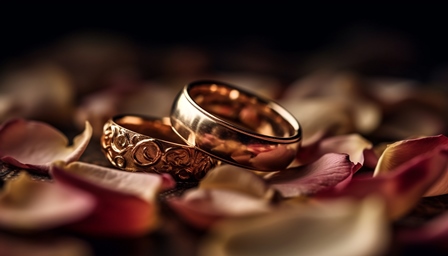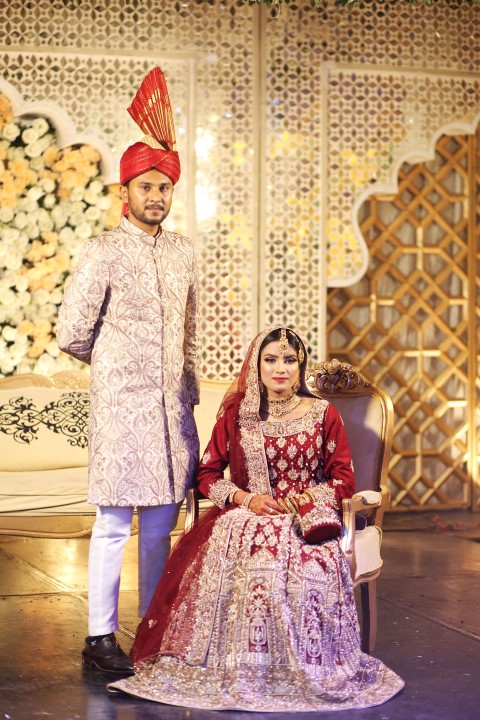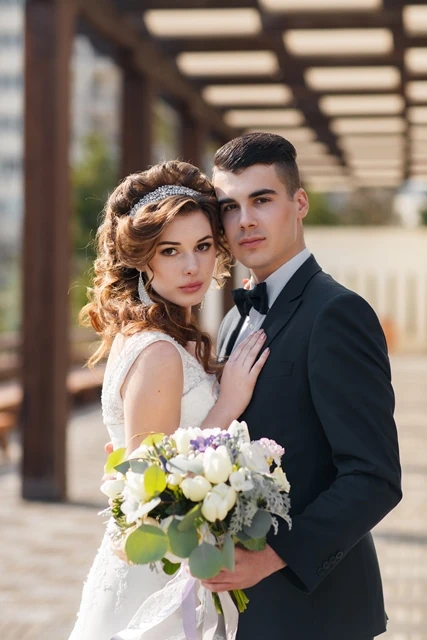A traditional Pakistani wedding, or “Shadi,” is a vibrant and elaborate affair, filled with rich cultural rituals and festivities.
Here’s an overview of the typical components of a Pakistani wedding:

Pre-Wedding Rituals:
- Mangni/Engagement Ceremony: This is the formal engagement ceremony where the families exchange rings and gifts as a symbol of commitment between the couple.
- Mayun: This is a traditional cleansing ritual where the bride’s face is adorned with turmeric paste to enhance her beauty before the wedding day. It’s often a playful and festive event with singing and dancing.
- Mehndi: The Mehndi ceremony involves applying intricate henna designs to the bride’s hands and feet. It’s a joyous occasion with music, dancing, and traditional performances.

Wedding Day:
- Baraat: This is the groom’s wedding procession, where he arrives at the wedding venue accompanied by his family and friends, often on a decorated horse or in a lavish car. There’s typically a lot of music, drumming, and dancing.
- Nikkah: This is the Islamic marriage contract ceremony where the couple officially becomes husband and wife. It’s conducted by an Islamic scholar or a religious figure, and the bride and groom accept each other as partners in the presence of witnesses.
- Rukhsati: This is the emotional moment when the bride officially leaves her parents’ home to start her new life with her husband. It often involves tearful goodbyes and blessings from family members.
- Walima: This is the wedding reception hosted by the groom’s family to celebrate the marriage. It’s a grand feast where family and friends come together to congratulate the newlyweds and enjoy delicious food and entertainment.

Post-Wedding Rituals:
- Doodh Pilai: This is a playful tradition where the bride’s sisters and friends offer a milk drink to the groom and negotiate for gifts in return.
- Muklawa: This is when the bride visits her parents’ home after the wedding, often accompanied by the groom, to receive blessings and gifts from her family.
- Chauthi: This is a ceremony held on the fourth day after the wedding where the bride’s family hosts a meal for the newlyweds and presents them with gifts.
Throughout the entire wedding process, there’s an abundance of food, music, dancing, and colorful attire, reflecting the warmth and hospitality of Pakistani culture. Family and community play a central role, and weddings are seen as an opportunity to strengthen bonds and celebrate love and togetherness.
Traditional Pakistani Wedding (Shadi):
This is the most common type of wedding in Pakistan, characterized by various pre-wedding, wedding, and post-wedding rituals deeply rooted in cultural traditions.
Pre-wedding rituals may include the engagement ceremony (mangni), mehndi (henna) ceremony, mayun (a traditional cleansing ritual for the bride), and dholki (musical gatherings).

The main wedding ceremony usually involves the exchange of vows (nikah) conducted by an Islamic cleric or qazi, followed by a reception where guests celebrate with food, music, and dancing.
Post-wedding rituals may include the ruksati (departure of the bride from her parents’ home to her husband’s home) and walima (a reception hosted by the groom’s family to celebrate the marriage).
